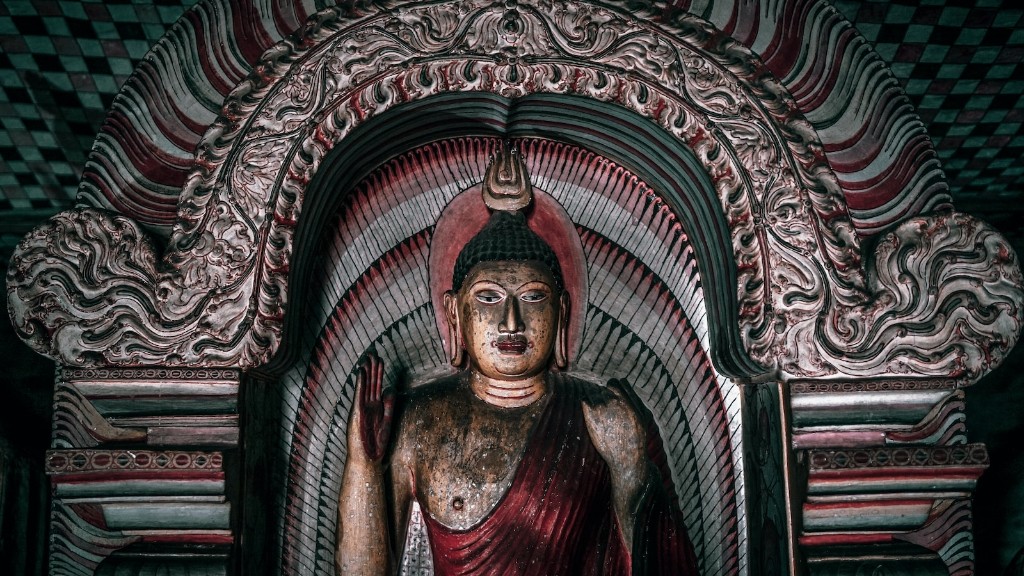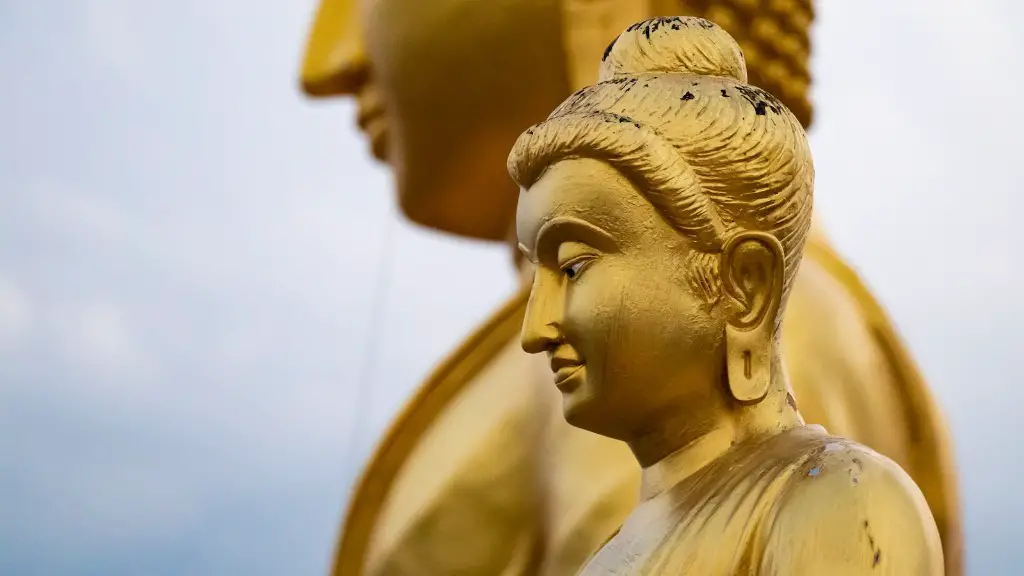The Theravada tradition is the oldest of the extant Buddhist schools. It is conservative in its teaching, and is known for its insistence on the monastic Dharma. The Theravada school believes in the Three Jewels of the Buddha, the Dharma, and the Sangha. It teaches that the Buddha is a supreme teacher who attained full enlightenment and was undefeated in debate. The Dharma is the truth of his teachings, and the Sangha are the monks who follow the Buddha’s Dharma.
Theravada buddhism is founded on the Pali Canon, and the belief is that this is the word of the Buddha. The school is focused on achieving individual liberation through one’s own efforts, rather than depending on outside forces. Theravada buddhists often follow the Noble Eightfold Path and the Four Noble Truths in order to end suffering.
What is Theravada Buddhism belief in God?
Buddhists do not believe in any kind of deity or god, although there are supernatural figures who can help or hinder people on the path towards enlightenment. The path to enlightenment is one of self-awakening and discovery, and Buddhists believe that it is possible for anyone to achieve it.
Theravada Buddhism is the older and more conservative of the two main divisions of Buddhism. It is often referred to as the ‘traditions of the elders’. Many Theravada Buddhists follow the teachings of the Buddha exactly, and many of them are monks or nuns. Theravada Buddhists strive to be arhats.
What is Theravada Buddhism in simple words
Theravada Buddhism is the older of two major Buddhist traditions, both of which center around the attainment of nirvana, a perfect state of enlightenment. Theravadins follow the original sutras, or teachings of the Buddha; however, monks and laypeople have different roles. Monks are expected to live a life of poverty and chastity, while laypeople are allowed to live a more worldly life and can even marry and have families. In Theravada Buddhism, it is believed that only monks can attain nirvana; however, laypeople can still achieve rebirth in a higher realm.
Theravada Buddhism is unique in its emphasis on monastic life. The majority of Theravada practitioners choose a monastic path away from the secular world. This commitment to monasticism means that Theravada Buddhism is less concerned with social engagement and more focused on personal spiritual development.
What are the three main characteristics of Theravada Buddhism?
The Theravada school of Buddhism is one of the two main schools of Buddhism (the other being Mahayana Buddhism). Theravada Buddhism has its roots in Sri Lanka and Southeast Asia, and its major characteristics include the importance of the Pali Canon of scripture and commentary, the veneration of the historical Shakyamuni Buddha, and the spiritual model of the arahat, or “worthy ones” who have attained nirvana.
No, animals do not have souls according to Buddhism. This is because there is no such thing as a soul or self in the sense of a permanent, intrinsic, autonomous “I”. We are all soulless creatures alike.
Does Theravada believe in reincarnation?
There is a lot of debate among Buddhists about what happens after death. Some Tibetan Buddhists believe that there is an in-between stage known as the bardo which can take up to 49 days. Theravada Buddhists (from Sri Lanka, Myanmar, Thailand, Laos and Cambodia) consider that rebirth can be immediate. Those who attain enlightenment (nirvana/nibbana) do not get reborn upon their death. There is still much disagreement on this topic, but it is an important belief for many Buddhists.
Puja is an important part of both Theravada and Mahayana Buddhism. Theravada Buddhists perform puja by putting flowers and candles in front of an image of the Buddha as an offering. In Mahayana Buddhism, puja ceremonies take place over a longer period of time. Through prayer, Buddhists request blessings from the Buddha and sometimes ask for help.
What are the Four Noble Truths of Theravada Buddhism
The Four Noble Truths are the truths of suffering, the cause of suffering, the end of suffering, and the path to the end of suffering. They are designed to help us understand the nature of suffering and its causes, so that we can develop the skills and knowledge necessary to bring about its end.
Theravada, (Pali: “Way of the Elders”) is the major form of Buddhism prevalent in Sri Lanka (Ceylon), Myanmar (Burma), Thailand, Cambodia, and Laos. Theravada, like all other Buddhist schools, claims to adhere most closely to the original doctrines and practices taught by the Buddha.
What is the difference between Mahayana and Theravada?
There are two main schools of Buddhism, Theravada and Mahayana. Theravada Buddhism is focused on the individual and achieving their own liberation from suffering through escaping the cycle of reincarnation known as Samsara. In contrast, Mahayana Buddhism emphasizes compassion and staying in Samsara in order to help others achieve enlightenment. While both schools have the same goal of ending suffering, they take different approaches to achieve it.
Nirvana, or the liberation from cycles of rebirth, is the highest aim of the Theravada tradition. The Theravada tradition holds that there are three states of existence: saṃsāra, or the cycle of rebirth; nirvana, or liberation from rebirth; and an intermediate state between the two. Nirvana is attained by following the Noble Eightfold Path and realizing the Four Noble Truths.
Do Theravada Buddhists pray
Buddhists know that Buddha does not grant special favours or requests. They may appear to pray or worship Buddha images, but it is not done in the same way as it is with other religions.
Buddhism teaches that alcohol and other drugs can cause carelessness and should be avoided. This is because Buddhism believes that intoxication can lead to bad decisions and actions that can harm oneself and others. Strong Buddhist beliefs would have a significant impact on someone’s alcohol use, and they would likely avoid drinking or using other drugs altogether.
Does Theravada Buddhism believe in karma?
Karma is often thought of as a sort of cosmic justice system in which good deeds are rewarded and bad deeds are punished. This can lead to the idea that if something bad happens to someone, it must be because they did something bad in a past life.
However, karma is not just about this life. It also has implications for future lives. This is because the effects of our actions are not always immediate. They can take some time to manifest, and this is especially true when it comes to the karmic effects of our actions.
Even an enlightened being is not exempt from the effects of past karma. This is because the karmic effects of our actions are often cumulative. They can take some time to manifest, and they can have a major impact on our future lives.
Violence in any form, under any pretext whatsoever, goes against the teachings of the Buddha. This was made clear by Rahula when he said that violence has no place within Buddhist teachings or cultural practices in Buddhist communities.
Final Words
There is no one answer to this question because beliefs vary from person to person within the Theravada Buddhist tradition. However, some central beliefs shared by many Theravada Buddhists include the four Noble Truths, the doctrine of anatta (non-self), and the Eightfold Path. Theravada Buddhists also generally believe in rebirth and the willingness of enlightened beings ( such as the Buddha) to help others achieve liberation.
There are four beliefs of the Theravada Buddhism which are:
1. The Three Jewels: Buddha, Dharma, Sangha
2. The Four Noble Truths
3. The Noble Eightfold Path
4. The law of Karma


